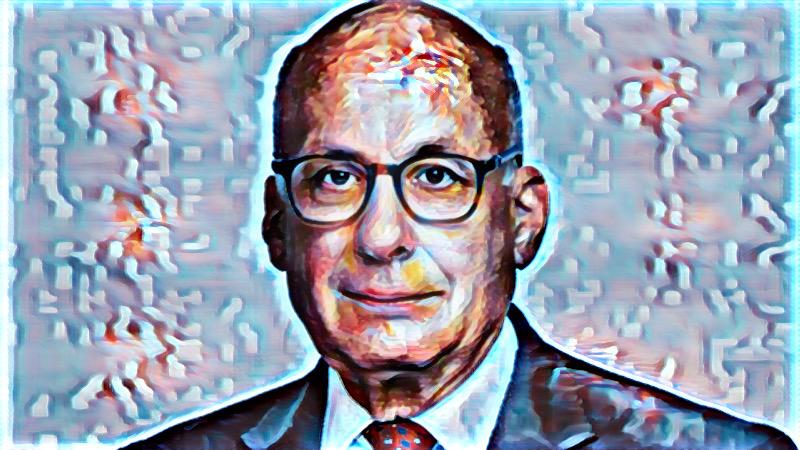Dennis Unkovic is a partner at the law firm Meyer, Unkovic, and Scott LLP in Pittsburgh, PA. He is the author of “The Fragility of China: Breaking Points of an Invincible Regime.”
This transcript has been edited for length and clarity.
Federal Newswire: What drove you to write this book?
Unkovic: Between 1986 and 1992, people thought Japan was going to rule the world. Everybody thought Japan was going to rule the world. I didn't think that was true. Obviously, Japan has not been in a very strong economic position since the mid-90s.
But I have always had my eye on China because from the standpoint of size, it's significant. China has about 1.3 to 1.4 billion people. The Chinese are very hardworking. I think under Xi Jinping, who's been in power since about 2013, you have a very strong leader in China.
I think Xi has his eye on being or making China the single most powerful political, military, and economic country in the world. His magic date is 2049… 100 years since Mao took over China, and the Communist Party has been in control ever since.
I just felt it was time to write a book about China. I can assure you I'm not very popular in China, because I discuss what I see as China's vulnerabilities as well as strengths.
Federal Newswire: You coined the term “Max Trends” for your book. What does that mean?
Unkovic: In my book I have 14 Max Trends. But I think there are 5 or 6 that are really key.
The first one is demographics. The next one is China's real estate crisis. It is significant. It's ongoing, and it's really affecting whatever Xi Jinping wants to do or things he can do now. They have a failing or a problematic global supply chain. Taiwan is, I think, maybe the most dangerous flashpoint in the world today.
Federal Newswire: What is the Max Trend regarding China’s demographics?
Unkovic: China in the 1960s was so poor that millions of people died from starvation. There was a guy named Maltheus who was an economist from the 19th century. He basically said, the world will fail because there will be too many people, there won't be enough food, and everybody will die.
Well, obviously that didn't happen. But the Chinese, after going through starvation and problems under Mao…put in the one-child policy. A woman or a family was told, “You may have one child, but if you have two children, you will be punished economically. You may not have a job.” As a result, 2023 was the first time when the Chinese population actually dropped.
It's a very serious problem for China, because they have an elderly population.
Why is this important? I saw a study recently that said 60-70 years from now, the Chinese population will be 700 million, or it's going to be essentially half, give or take, what it is today.
Federal Newswire: Has modernization and the inverted population pyramid hurt China?
Unkovic: It's like a double whammy. First, there are not enough children coming. The people in China who are over 60 do not have a social bottom like we do in this country. We have Social Security and Medicare. No matter what you think of those things, people at a certain age when they retire have a certain level of income that doesn't exist in China. So the Chinese people are expected to save.
The other thing is, in the old days when people would have 3-5 children, your family would say, “okay, mom or dad, come and move with us or we'll help support you.” That's not happening anymore.
So fewer people are working to support this massive country. Fewer younger people are coming up. At the other end, the people over 60 are getting older. That's one of the reasons that China's economy, which used to grow at between 8-12% for almost 25 years, will be lucky to grow at 4.5% this year.
Federal Newswire: How does China deal with needing citizens willing to work on an assembly line and live in dorms while also having citizens who want to buy Gucci products and study abroad?
Unkovic: Chinese labor 35 years ago used to be cheap. There is no more cheap Chinese labor.
So the cheap Chinese labor of the past is not there. There are fewer potential workers. That's really a big problem for Xi Xinping, because he's saying, “work harder, grow our economy.” Today the Chinese GDP is about $17.7 trillion a year.
If you grow your economy at 8% per year over a period of eight and a half years, you double it. The Chinese economy in the ‘60s was in the billions of dollars. Now it's 17 trillion, but it doubled again and again until about 2017-2018. It slowed down, and that's the problem China is facing. It's more expensive, harder to manufacture things cheaply, and there are fewer people to do it.
Federal Newswire: What are the national security and economic implications of America having so much of its supply chains based out of China?
Unkovic: Both former President Trump and President Biden looked at China with concern. We have national security interests that we need to protect.
As a result, the ability to acquire things from China is becoming more difficult. We are blocking certain technologies that were allowed to go into China.
The supply chain for 30 years worked fairly well, because we didn't have major disruptions. But even today there are announcements about maybe an increasing war in the Middle East, and we know what's going on in the Ukraine. These are affecting the global supply chain.
I think a lot of American companies over the years weren't very smart. They said, “where can I do it cheaply?” Well, the answer is you could have done it in China or in Vietnam, but can you get it here when you need it? A lot of companies, to their regret, found out that doesn't happen.
Federal Newswire: How does the Chinese property market differ from America’s?
Unkovic: In the United States, about 17% of our economy is based upon commercial and residential real estate. In China, it's almost twice what it is here. If you're a successful person and you have savings, you can put it in the stock market or a house, you can put it in various things in order to save money for the future. In China, beginning in 1996, for the first time, the Chinese people were allowed to buy real estate. The government still owns the real estate. But you were given a 70-75 year lease on an apartment, but for our purposes you essentially own it.
What the Chinese people did is they put almost all of their savings into real estate, because the stock markets over there are not a place I think you want to put serious money into.
That's where their savings were 80-90% starting in the year 2020, about the time of Covid. The real estate market collapsed, and it has still collapsed. If China was growing at 8-10% per year, why is it now 4-5%? The answer is a third of the money is in real estate.
The average person in China, the consumer, is a very small part of their economy. It used to be driven by manufacturing, making stuff and selling it. But the average person in China is saying, “I don't see my money. I see deflation, not inflation.”
At the end of the day, real estate is the big drag on the Chinese economy. I see no improvement in the short run.
Federal Newswire: Taking into account China’s rhetoric and actions against the U.S. and China’s neighboring countries, what options does the U.S. have to deal with China?
Unkovic: Xi Jinping has been in power since 2013, he's now in his third five-year term and has been massively building up the military, particularly the People's Liberation Navy.
Now you have China, Japan, Taiwan, and the South China Sea. China has essentially tried to say, “this is my area and I wish to control it,” because they also have to deal with Vietnam, Malaysia, and Indonesia. Now what the Chinese have also done is take control of some atolls like coral reefs on which they put enormous military bases. The Chinese are trying to interdict, sometimes directly, sometimes indirectly, the Philippines and everybody else from going through there.
Now why do they care? Well, in theory, the Chinese are going to say, “we don't want anybody going through there, so no one can block our ports.” That's not it. About 4 to 5 trillion goods go through the straits and essentially go over to North and South America. The Chinese are now making it very difficult for people to transit that area.
They are building up what's called a blue water navy. A blue water navy means a country doesn't just protect its coastline, but it can project power all over the world. There's only one blue ocean navy in the world today. That's the United States. We essentially have 12-13 carrier groups. They're all nuclear, and they're all over the world.
What the Chinese are doing is now building their own carriers, and they're essentially using these bases, which are in the middle of the South China Sea, to say, “excuse me, this is my land.”
That, I think, is the single most important thing in the short run that the U.S. Congress should appropriate money too.
Federal Newswire reports: What other actions can we take?
Unkovic: One thing I think we need to do is to focus on Africa. What will be the largest population in the world in 2050? It's going to be Africa. Africa, as we know, has traditionally had a lot of problems. But a lot of the key things we need, such as lithium, rare earth metals and other materials come from Africa.
What the Chinese have been doing is putting a full court press on Africa, because they want to have control of the key things that come out of Africa.
Another thing is cyber. The Chinese have made significant cyber attacks on the U.S., as have some other countries. More and more of the world is going to be controlled by what you see and what you hear. The importance of cyber to me is something that needs to be a higher priority.
But the thing that's most important for the U.S. over the next 30 years comes in one word: Innovation. The thing that is moving the world today is technology. Two-thirds of the technology in the world today is probably Western technology. A third of it probably comes from China. But the Chinese put in an initiative called China 2025. They looked at 24 or 25 key technologies, and they've been working in those areas.
The U.S. and the West will continue to be strong if they continue to innovate and control technologies. In my opinion, it is the single most important thing we can do.
Federal Newswire: What role do you think a policy of reciprocity should play in our relationship with China?
Unkovic: One of the things the Chinese have consistently been doing is if you had a factory that you owned in China or were doing a joint venture, they would insist upon involving themselves in understanding what your technology is and how they can use this technology.
In the U.S. we have either patents or we have trade secrets. But the really valuable things today are trade secrets. The Chinese have been trying to extract as many technologies as they can from the West, and that is a real concern.
Another thing the Chinese are doing is if you have a factory there, they often have a member of the Chinese Communist Party essentially on your board.
So I'm really concerned about the fact that until the Chinese are treated here as we're treated over there, we need to be tougher on dealing with them. If that means less investment in China, well, then it means less investment in China.
I take my hat off to the Biden and Trump administration’s for saying, ”look, if you're not going to allow this for us, we're going to make it more difficult for you to bring your products on this supply chain over the Pacific into the United States.” Now nothing's perfect, and this isn't going to be a perfect thing, but the Chinese have to understand this time we're serious, and if you don't do it, you're going to see less investment.
Federal Newswire: Where should people go to follow your work and go to find your book?
Unkovic: My book is called “The Fragility of China.” Probably the easiest place to get it is on Amazon Books or you can order it from your local bookstore. I want Americans to take China more seriously. It's not the biggest, most terrible country in the world. It's not going to defeat America. But if America doesn't take it seriously, the Chinese are smart, they're hardworking, and they're aggressive, and their goal is by 2049 to be the premier economic, political, and military power in the world today. I would like it to remain the United States.








